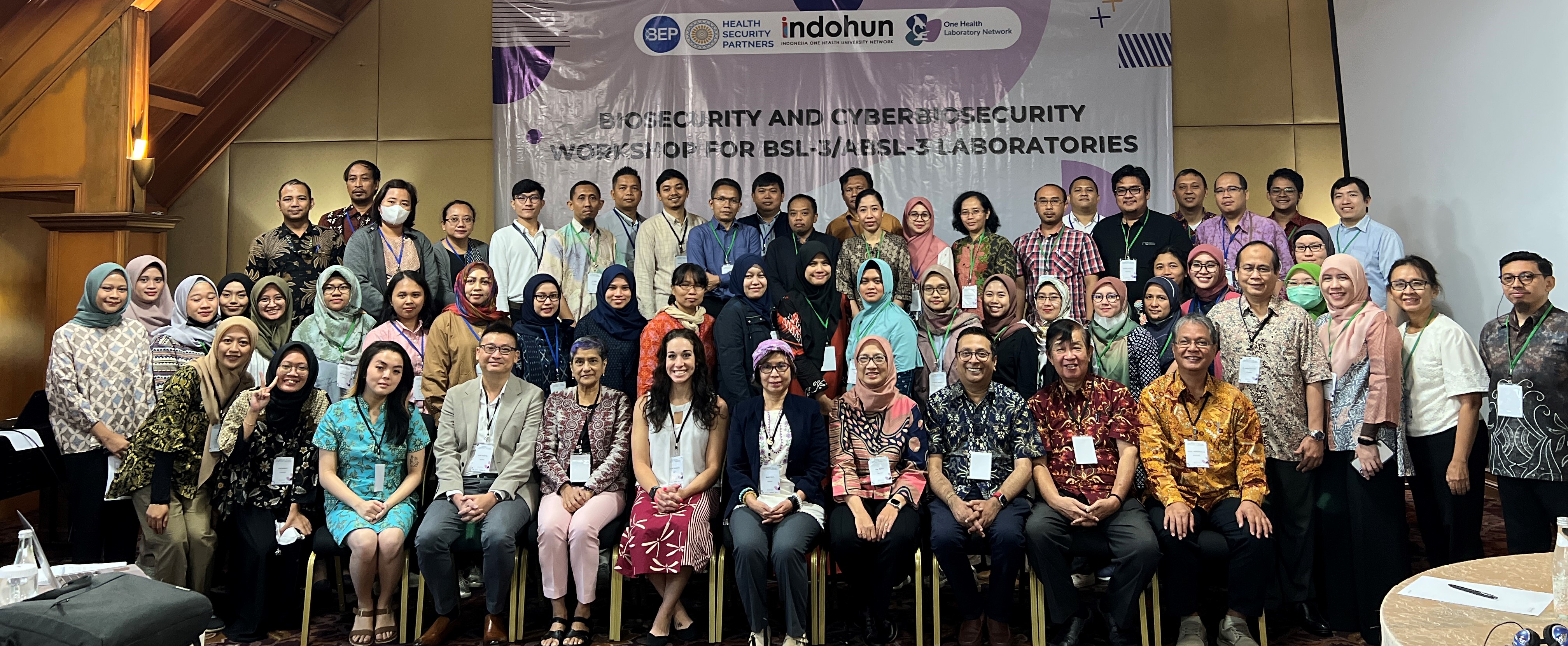BSL3 (Biosafety Level 3) or ABSL3 (Animal Biosafety Level 3) is a laboratory safety level specifically designed for the research and manipulation of pathogenic microorganisms that can cause serious disease in humans or animals. BSL3/ABSL3 facilities adhere to strict standards in terms of design, equipment, and work protocols to prevent the spread of dangerous diseases. In this environment, researchers must wear tight-fitting protective clothing, and laboratories must have a robust air safety control system to prevent the leakage of pathogenic microbes. BSL3/ABSL3 is critical in understanding, identifying, and developing preventive measures and treatments for serious infectious diseases.
Laboratories are an important element in supporting the nation’s development and progress as well as state resilience. For example, laboratories that have BSL3/ABSL3 facilities are used for vaccine research and development, handling dangerous pathogens, diagnostics of infectious diseases, and scientific research involving potentially dangerous biological agents. A high level of biosecurity in BSL3/ABSL3 laboratories needs to be implemented to protect laboratory staff, the public, and the environment from the risk of the spread of dangerous pathogenic agents.
In addition, the emergence of dangerous diseases such as the COVID-19 pandemic has significantly increased awareness of the need for strong biosecurity. Laboratories with BSL3/ABSL3 facilities have a large responsibility for managing and handling pathogenic agents that have the potential to be dangerous to humans. Then, along with advances in information technology, laboratories also face the risk of cyberattacks.
Activities carried out in BSL3/ABSL3 laboratories often involve sensitive data and important information. Threats such as data theft, malware attacks, or misuse of information systems can have serious consequences.
Realizing this urgency, Indonesia One Health University Network (INDOHUN) through the One Health Laboratory Network (OHLN) program in collaboration with the Biosecurity Engagement Program (BEP) through Health Security Partners (HSP) has carried out activities to increase the capacity of laboratory personnel through the workshop “Biosecurity and Cyberbiosecurity for BSL3/ABSL3 laboratories.”
This activity was held with the aim of:
- Increase understanding of biosecurity and cyber security.
- Increase participants’ understanding of the importance of a safe and secure culture in working with hazardous biological materials.
- Participants can find out about regulations and guidelines related to biosecurity and cyber security that are currently in force.
- Train laboratory personnel in dealing with emergency situations related to biosecurity, such as leaks of pathogenic agents or cyber attacks.
- Encourage laboratory team collaboration in implementation, address security as a priority, and ensure compliance with established security procedures.
This activity was carried out for three days, Tuesday – Thursday, 22-24 August 2023, at the Gran Melia Hotel, Room Nusa Dua Floor 15, Jakarta.
In this activity, INDOHUN invited government institutions, universities and private institutions, including:
- Food and Drug Supervisory Agency (BPOM)
- National Research and Innovation Agency (BRIN)
- Center for Veterinary Standard Instrument Testing , Ministry of Agriculture
- Faculty of Medicine – Diponegoro University
- School of Veterinary Medicine and Biomedical Sciences – IPB University
- Institute of Tropical Diseases – Airlangga University
- Bandung Institute of Technology
- Integrated Research and Testing Laboratory (LPPT) – Gadjah Mada University
- Faculty of Medicine, University of Indonesia
- Center for Primate Animal Studies (PSSP) IPB University
- Science Techno Park (STP), IPB University
- School of Life Sciences and Technology – Bandung Institute of Technology
- PT Bio Farma
- PT Biotis Pharmaceuticals Indonesia
- PT Caprifarmindo Laboratories
- PT Genomics Solidarity Indonesia
- PT Sanbio Laboratories
- PT Vaksindo Satwa Nusantara, and
- PT. Medion Farma Jaya
This activity was opened directly by Dr. Julia Scordo as Biosecurity Engagement Program of the US Department of State (BEP/DOS), then continued with remarks from Mrs. Wahyuni Kamah as Biosecurity Engagement Program (BEP) Manager, USA Embassy – Jakarta, then remarks from Dr. Prasad Kuduvalli as Director of Scientific Programs, Health Security Partners (HSP) , and final remarks by Prof. Dr. Agus Suwandono, M.PH., Dr.PH as coordinator of the Indonesian One Health University Network (INDOHUN).
For 3 days, participants received material relevant to BSL/ABSL3 laboratory activities as well as presenters who were experts in their fields. The materials obtained during the 3 days of participating in the activity include:
Day 1 :
- Basics of biosafety and biosecurity – Dr. Viji Vijayan
- Operation and Maintenance – Dan Yoong
- Risk Assessment and Mitigation – Dr. Viji Vijayan
- Personnel Reliability – Dr. Viji Vijayan
Day 2 :
- Cybersecurity and Information Security – Dr Rodel Jonathan S.
- VBM inventory and accountability – Dr. Dr. Susan Maphilindawati Noor, MVSc. IFBA-PC- Indonesian Biorisk Association
- Operation and Maintenance – Dan Yoong
- Decontamination and waste management – Dr. Viji Vijayan
- Transportation safety – Dr. Dr. Susan Maphilindawati Noor, MVSc. IFBA-PC- Indonesian Biorisk Association
- Emergency Response and Contingency Planning – Dr. Viji Vijayan
Day 3:
- Biorisk Management System – Dr. Drh. Diah Iskandriati , IFBA-PC – Indonesian Biorisk Association
- Dual Use in research – Dr. Prasad Kuduvalli
- Get to Know Your Collaborators – Stephanie Mattoon
- Biorisk Management Tools for Continuous Improvement and self-assessment – Barbara Johnson
- BSL3 and ABSL3 Certification – Dan Yoong
- ISO 35001:2019 Certification – Dr. Drh. Diah Iskandriati – Indonesian Biorisk Association
The three-day intensive BSL3/ABSL3 workshop became an inspiring platform that invited participation from various government agencies, universities and private institutions in Indonesia. With a focus on Biological Security Level 3 (BSL3/ABSL3), this workshop provided a comprehensive summary of the latest practices in handling and research on hazardous biological materials. The material presented is very relevant to today’s needs, covering technical, regulatory and ethical aspects related to BSL3/ABSL3. Workshop participants are given the opportunity to interact directly with presenters who are leading authorities in various aspects of related science. Their expertise in their respective fields helps participants deepen their understanding of safety protocols, infection control, as well as the latest innovations in BSL3/ABSL3 technology and methodology. This workshop provides a unique platform for cross-institutional knowledge exchange and the development of valuable networks, while also encouraging scientific collaboration that can shape the future of research in this critical field.
With great enthusiasm, Workshop “ Biosecurity and Cyberbiosecurity for BSL3/ABSL3 laboratories ” reaches a proud closing moment, as a series of closing events Dr. Prasad Kuduvalli as Director of Scientific Programs, Health Security Partners (HSP) in motivating closing words, he emphasized the importance of increasing insight and collaboration in facing increasingly complex BSL3/ABSL3 challenges. As a concrete step to encourage the implementation of innovative ideas, Dr. Prasad announced the launch of the Competitive Grant program from HSP to Strengthen Biosecurity and Biosafety Capacity at BSL3 /A BSL3 Laboratories in Indonesia. This program provides the opportunity for workshop participants to submit proposals with transformational potential, with funds up to a maximum of 30 thousand USD . The purpose of this competitive grant is to support the implementation of physical security improvements, inventory management systems, waste management systems, procedural improvements, training and activities to continuously improve biorisk management, biosecurity , and biosafety within the facility, based on gaps identified during the laboratory assessment and plan increased security . HSP will also consider proposals aimed at addressing other Biorisk Management ( BRM ) gaps identified through the assessment. This competitive grant is funded by the Biosecurity Engagement Program (BEP), Department of State , USA.
While the enthusiastic atmosphere was still palpable, the special moment continued with the distribution of certificates to the presenters, participants and parties who had contributed to the success of this workshop. As a worthy closing, Mr. Dr. Drh Joko Pamungkas as Deputy Coordinator of INDOHUN officially closed this activity, but the spirit of collaboration and knowledge gained will remain with every participant, coloring the steps towards a safer and more innovative future in biological research.





Leave a Reply